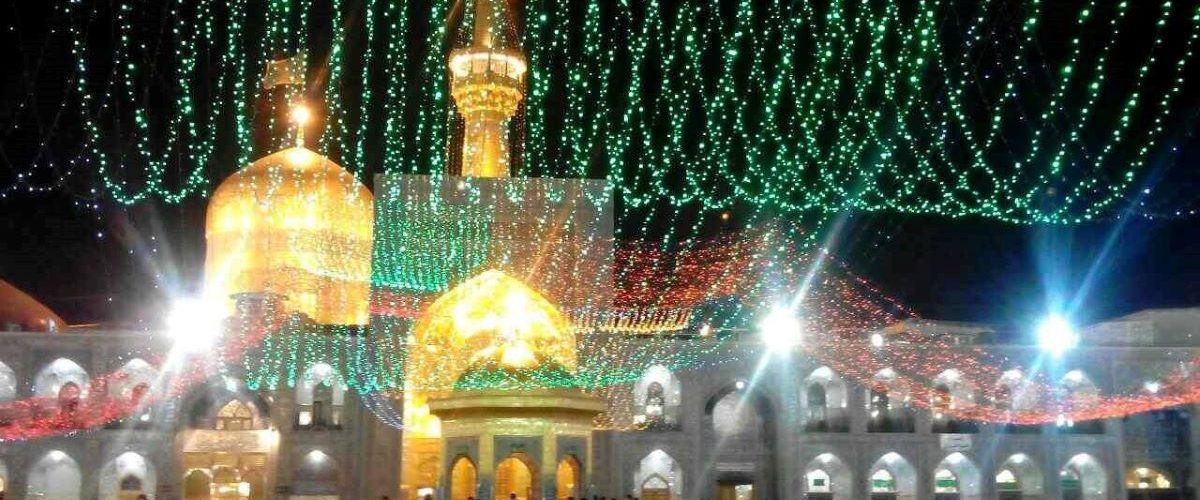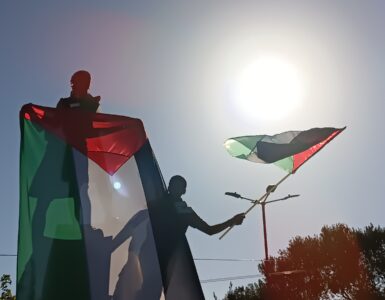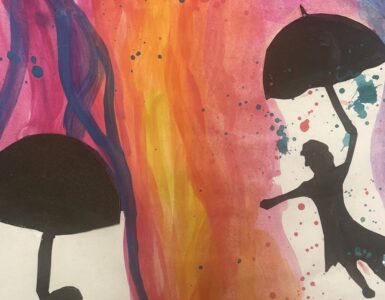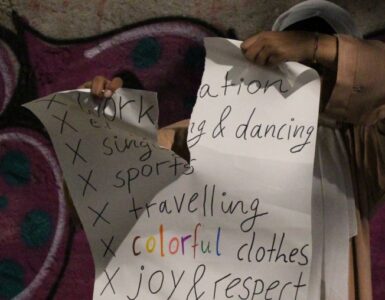Many people might be questioning, why so many Afghans who lived in Iran for years, are now moving to Europe. The world considers Iran as a safe country but this is not true for Afghans. There is no war in Iran but Afghans who live there face a psychological battle through a war of ideas.
I was born and grew up in Iran, but they still call me an “Afghan”. When I go to my own country (Afghanistan) they call me an “Iranian”, because I do not look like an Afghan. I am an alien in both countries and I hate the fact that I am treated as if I have no identity. It is depressing if you cannot tell where you belong. I am asking myself, whose fault it is that I have no identity? Who is responsible? Is it my parents? Or are the politics in Iran? I don’t know.
I feel so sorry for my mother. She was born in Afghanistan and grew up in Iran and now for the sake of her children’s future she has to spend the rest of her life in Europe.
My mother has had the experience of migration. She left her homeland and moved to another country, when she was 17 years old. When the former Soviet Union army attacked Afghanistan in 1980, my mother followed her family which took shelter in Iran. She has nothing to remind her of her childhood and she has been away from her homeland, her friends, her school and her parents for many years. She spent most of her life in Iran, but she never got a document proving that Iran would be her home for ever. She constantly lived with the fear of being deported to Afghanistan.
We had a comfortable life in Iran, but not a peaceful one. We cohabited with fear and anxiety. It was so hard for Afghan children to get accepted to school in Iran. Every year we had to go through a long process at the Ministry of Education of Iran. I remember that it was the hardest time of the year for my father, because he had to go to the Ministry many times and queue up for hours, as the officials used to say: “We are not allowed to register Afghan children for this year yet, so you’ll have to be patient once more”, and the same thing would happen every year. We didn’t know if this year we would go to school or not. Imagine how hard it is for a schoolchild to be in a state of uncertainty about going to school or not for about one month every year. Also, it costs a lot of money for Afghan children to go to school. Many children didn’t have the possibility to go to school because of financial difficulties. Moreover, just because we were Afghans we couldn’t continue our education after high school. Nor were we allowed to participate in educational and athletic Olympiads. If we wanted to travel inside Iran, we needed a special permission with only 10 days validity, and certain cities were forbidden for Afghans. Patience was the most useful lesson that an Afghan mother could teach her children.
Sometimes we had an argument with our Iranian schoolmates who were telling us: “You are Afghan, why don’t you go back to your country?”. We would cry, run to our mother’s hug and ask her, “Why are we here? Don’t we have a homeland to go?”. And my mother would respond, with her eyes full of tears, but we couldn’t understand her answers.
When we grew up, my mother gave us an advice: “accept the good words of your friends with your whole heart, try to ignore their bad words or taunts, and forgive them”. As time passed, she taught us that not only we are guests in Iran, but also uninvited ones. Afghan refugees in Iran were not allowed to buy a home or a car. For Afghans it was not even possible to buy a cheap SIM card in their own name. We would need to ask an Iranian acquaintance to buy a SIM card for us and most of the times they would refuse, since they had been taught that they should not support their Afghan friends.
Afghans used to do the hardest jobs in Iran but all the media were blaming Afghans for the high rate of unemployment in the country They were blaming Afghan refugees for every single social and financial problem of their country. You needed a deaf ear not to listen to these blames and taunts, you needed a voiceless mouth and blind eyes not to see all the discriminations.
As an Afghan refugee in Iran you had to pay by yourself for all your expenses if you would get sick. If you needed to go to the hospital, you had to pay first and then they would reimburse you and if you didn’t have enough money, you would prefer to die.
Even if you had lived in Iran for many years, you would had to renew your documents every year by paying a lot of money and once you could not pay, you would run the risk of being deported to Afghanistan, no matter how long you had been living there. All these issues wiped the peace out of our lives.
I had the misfortune of being a refugee all my life, in Iran. I had the misfortune of being regarded as a person without identity. I had the misfortune of being treated as an alien all the time. I don’t know for how long we will be refugees. We have gone through the painful experience of living as refugees for many years. It looks like a heritage, coming from my grandfather to my father and from my father to me and I don’t know how many more generations will undergo this ordeal. Living as a refugee feels like destroying a building and building it up again, and some refugees are repeating this process many times.
Nevertheless, I didn’t leave Iran with empty hands. I carried along many things. I brought my mother’s grey hair, my father’s weak eyes and my brother’s broken pride. And now that I’m in Europe after going through all sorts of terrible ordeals, I am facing another kind of segregation. My country has been burning in the fire of war, discrimination, discord and sedition for the last forty years. The children of my country have been buried alive. The mothers of my country are mourning for their dead children. The fathers of my country fought the enemy and they are dead too. The young people of my country moved away with their mothers and their little brothers and sisters to save their lives. Our mothers left their homes which were full of memories. They dreamt to go to a land where people would respect the human rights, where there would be no discrimination, but they didn’t know that even here in Greece, Afghans are not supported as a part of the human community. In the eyes of the European authorities, only the Syrian refugees are first rate humans. Syrians left their country as we did because of the war, so I wonder whether war has a different meaning in different countries. I believe war is war everywhere.
We have gone through many dangers and we have risked our lives to arrive to a country where we were expected to be treated with humanity both by the government as well as the society. We have heard a lot regarding the recognition of the human rights. But we are facing a different picture. We realized that even in front of the European eyes we are second rate humans. And also since we are not part of the European Union we cannot assert our rights.
I don’t have the strength to name all these and write more…









Add comment